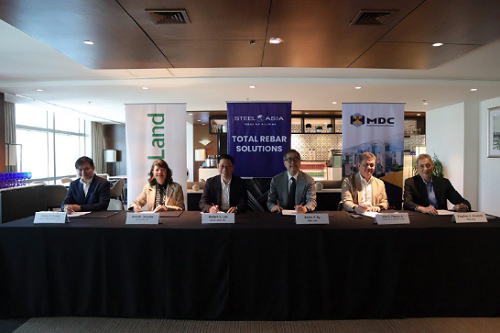SOURCE: Ayala Land Inc. (ALI)
27 February 2024 marked a historic day in Makati City. Ayala Land Inc. (ALI), SteelAsia Manufacturing, and Makati Development Corporation (MDC) signed a memorandum of understanding, heralding a groundbreaking collaboration. This partnership is designed to advance circular economy and decarbonization methods in the construction industry, setting the stage for a greener future.
The agreement is more than just a document—it's a commitment towards a sustainable future. It solidifies the practice of SteelAsia supplying MDC, the construction arm of ALI, with rebars made from recycled content sourced from scrap generated by ALI projects. This unique initiative exemplifies a tangible application of circular economy principles, underscoring waste reduction and cost-efficiency.
The synergy between the three companies is not a coincidence, but a strategic alignment of their core businesses. This collaboration is about more than just business—it's about pioneering a novel approach to the circular economy. At its core, the alliance aims to reduce the carbon footprints of the three companies, all while leveraging their diverse businesses for recycling and reusing rebars.
The joint statement from the group elucidates their shared vision. "We have found a common ground to pursue a common goal: reduce and recycle waste to protect the environment and fight climate change. This partnership will result in lower project costs, push industrialization, and save precious dollars. This is circular economy in action."
The journey towards a greener future is not new for ALI. The company began its decarbonization journey in 2017 when it committed to carbon neutrality for the controllable emissions of its commercial properties. The commitment was a bold leap towards a sustainable future, but for ALI, it was only the beginning.
In 2022, ALI set a target of net zero emissions by 2050. This ambitious goal underscores the company's unwavering commitment to sustainability and environmental responsibility. Recognizing the significant role of rebars in its supply chain emissions, ALI views the collaboration with SteelAsia as a crucial step towards realizing its net zero goals.
Rebars are more than just construction materials—they're a major source of carbon emissions. They make up about 50 percent of ALI’s supply chain emissions, which in turn account for 95 percent of the company’s footprint. This makes the recycling and reuse of rebars a key strategy in ALI's quest for sustainability.
The Philippines, like many other countries, traditionally exports most of its scraps and imports finished steel products. This low-value business model incurs high import costs that are ultimately passed on to project costs. This is where the collaboration with SteelAsia comes in.
SteelAsia, the country’s largest steel company, has been a trailblazer in steel-recycling. The company, powered largely by renewable energy, has been expanding its melt shop operations to replace imports and develop a thriving local steel industry. It has strategically located plants across the country to ensure consistent pricing nationwide.
SteelAsia's commitment to the circular economy is not just domestic. The company has exported to Canada and has supplied rebars to the largest local developer, including ALI. It even provided 100 percent of the rebars to build Cebu’s Cordova Bridge, among other projects.
As the construction industry embraces sustainability as a priority, the partnership between ALI, SteelAsia, and MDC sets a precedent for innovative and collective action. By embracing circular economy principles and decarbonization efforts, these industry leaders are demonstrating a commitment to sustainable development practices with far-reaching implications.
This alliance is more than a strategic partnership—it's a beacon for the entire construction industry. It proves that with synergistic collaboration and a shared vision, it's possible to create a sustainable future while ensuring economic growth. The future of construction is green, and ALI, SteelAsia, and MDC are leading the way.
The collaboration between ALI, SteelAsia, and MDC is a testament to the power of collective action. It's a blueprint for how businesses can work together to drive sustainable development and help combat climate change. As the world grapples with the urgency of environmental concerns, this alliance serves as a shining example of corporate responsibility and environmental stewardship.
Together, these industry leaders are charting a new path for sustainable construction. They are demonstrating that with a shared vision and a commitment to innovation, it's possible to build a future that is not only economically viable but also environmentally sustainable. Indeed, this alliance is more than just a partnership—it's a commitment to a greener future.





No comments:
Post a Comment